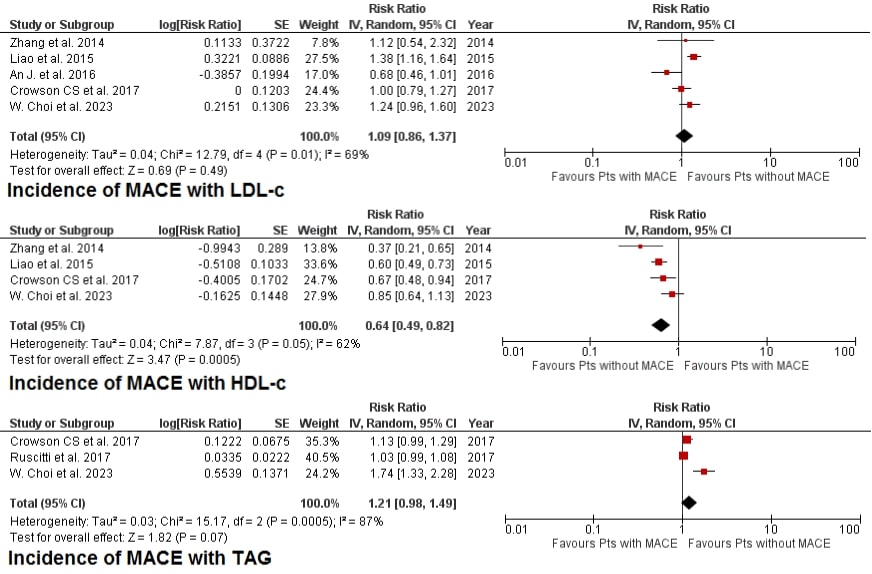Session Information
Date: Monday, November 18, 2024
Title: Vasculitis – Non-ANCA-Associated & Related Disorders Poster III
Session Type: Poster Session C
Session Time: 10:30AM-12:30PM
Background/Purpose: Cardiovascular diseases (CVD) are a significant cause of morbidity and mortality among patients with rheumatoid arthritis (RA), accounting for nearly 40% of their mortality. The chronic inflammatory nature of RA is known to contribute to an elevated risk of major adverse cardiovascular events (MACE). Dyslipidemia, characterized by abnormal lipid levels, is a key modifiable risk factor for CVD. Lipid profile parameters, including body mass index (BMI), high-density lipoprotein cholesterol (HDL-c), low-density lipoprotein cholesterol (LDL-c), triglycerides (TAG), and total cholesterol (TC), are commonly used to assess an individual’s risk of CVD. Understanding the impact of these lipid profile parameters on the incidence of MACE in RA patients is crucial for developing effective preventive strategies. This study aims to assess the relationship between different lipid profile parameters and the incidence of MACE in patients with RA.
Methods: We meticulously searched various databases, including PubMed, Ovid, and Embase, for studies published up to June 2024. These studies investigated the relationship between lipid profile parameters and the incidence of MACE in patients with RA. The primary outcome was the incidence of MACE with respect to BMI, HDL-c, LDL-c, TAG, and TC. We calculated pooled risk ratios (RR) and 95% confidence intervals (CI) using a random-effects model to account for study variability.
Results: All observational studies analyzed through a single-arm meta-analysis reported that the pooled risk ratio (RR) for BMI showed no significant difference in the incidence of MACE in patients with RA (RR: 1.00, 95% CI: [0.98, 1.02]; I²=0%; p= 1). In contrast, higher HDL-c levels were significantly associated with a reduced risk of MACE (RR: 0.64, 95% CI: [0.49, 0.82]; I²=62%; p= 0.0005), suggesting a protective effect of HDL-c in RA patients. LDL-c levels did not significantly correlate with MACE incidence (RR: 1.09, 95% CI: [0.86, 1.37]; I²=69%; p= 0.49). Elevated TAG levels were associated with an increased risk of MACE (RR: 1.21, 95% CI: [0.98, 1.49]; I²=87%; p= 0.07), though this did not reach statistical significance. Similarly, higher total cholesterol levels were linked to an increased MACE risk (RR: 1.15, 95% CI: [0.90, 1.46]; I²=96%; p= 0.26), but these results were not statistically significant. All these values are results from multivariable analyses adjusting for age, sex, hypertension, antihypertensive medication use, smoking, and diabetes.
Conclusion: Our study’s findings provide valuable insights into managing cardiovascular risk in patients with RA. Among the lipid profile parameters analyzed, higher levels of HDL-c were significantly protective against the incidence of MACE. This highlights the importance of managing HDL-c levels to prevent cardiovascular events in RA patients. However, other lipid parameters, including LDL-c, TAG, and total cholesterol, did not significantly correlate with MACE risk. These results underscore the need for further research to explore the underlying mechanisms and to develop targeted interventions for this high-risk population.
To cite this abstract in AMA style:
Shafique N, Khan A, Qadeer A, Shaukat z, Iqbal R. The Impact of Lipid Profile Parameters on the Incidence of Major Adverse Cardiovascular Events in Rheumatoid Arthritis Patients: A Single-arm Meta-Analysis [abstract]. Arthritis Rheumatol. 2024; 76 (suppl 9). https://acrabstracts.org/abstract/the-impact-of-lipid-profile-parameters-on-the-incidence-of-major-adverse-cardiovascular-events-in-rheumatoid-arthritis-patients-a-single-arm-meta-analysis/. Accessed .« Back to ACR Convergence 2024
ACR Meeting Abstracts - https://acrabstracts.org/abstract/the-impact-of-lipid-profile-parameters-on-the-incidence-of-major-adverse-cardiovascular-events-in-rheumatoid-arthritis-patients-a-single-arm-meta-analysis/



